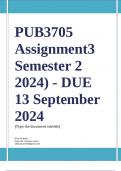PUB3705
Assignment3
Semester 2
2024) - DUE
13 September
2024
[Type the document subtitle]
[Pick the date]
[Type the company name]
tabbymwesh59@gmail.com
, Exam (elaborations)
PUB3705 Assignment 3 (COMPLETE ANSWERS)
Semester 2 2024 (526898) - DUE 13 September 2024
Course
Public Financial Administration and Management (PUB3705)
Institution
University Of South Africa (Unisa)
Book
Public Finance Administration
PUB3705 Assignment 3 (COMPLETE ANSWERS) Semester 2 2024 (526898)
- DUE 13 September 2024 ; 100% TRUSTED Complete, trusted solutions and
explanations. Ensure your success with us..
Discuss the measuring of public benefits as it relates to the spending of
public money in detail. In your discussion focus on fruitless and wasteful
expenditure, output and outcomes and accountability for outcomes.
Measuring public benefits is a crucial aspect of ensuring that the spending of public money is
effective, efficient, and yields positive outcomes for society. Public funds are derived from taxes,
and their expenditure must demonstrate clear benefits that justify their use. The process of
assessing public benefits involves examining not only the immediate outputs (products or
services delivered) but also the long-term outcomes (the actual impact or changes in society).
Additionally, it is essential to ensure that public funds are used responsibly, minimizing waste
and ensuring accountability.
Key Concepts
1. Fruitless and Wasteful Expenditure
o Definition: According to the South African Public Finance Management Act
(PFMA), fruitless and wasteful expenditure refers to expenses that could have
been avoided and that do not contribute to achieving the intended public benefit.
Essentially, it refers to spending that produces no value or benefit for the public.
o Causes: Fruitless expenditure often arises from poor planning, lack of oversight,
bureaucratic inefficiencies, and corruption. Examples include projects that are
started but never completed, purchasing services that are not needed, or paying for
goods at inflated prices.
o Impact: This type of expenditure drains public resources, reduces the funds
available for essential services (such as healthcare, education, or infrastructure),
and undermines public trust in government. The absence of value from such
spending means that public money does not contribute to improving social or




